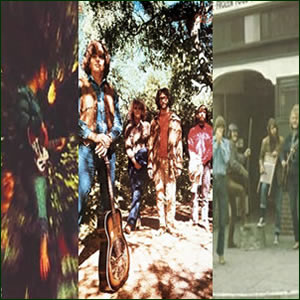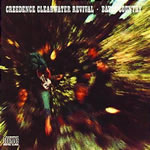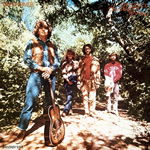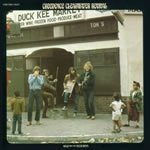Creedence Clearwater Revival
1969 albums
Buy Bayou Country
Buy Green River
Buy Willy and the Poor Boys
 Creedence Clearwater Revival was incredibly prolific in their earliest recording period. Following their self-titled debut album in mid 1968, the group released three more studio albums during the calendar year 1969 – Bayou Country. Green River and Willie and the Poor Boys – making it a grand total of four full-length album releases in just 18 months of real time. Composer, lead vocalist and guitarist John Fogerty produced all three of the 1969 albums and was the main driver in forging the sound of Creedence Clearwater Revival, which led to several hit songs at the time and has stood the test of time.
Creedence Clearwater Revival was incredibly prolific in their earliest recording period. Following their self-titled debut album in mid 1968, the group released three more studio albums during the calendar year 1969 – Bayou Country. Green River and Willie and the Poor Boys – making it a grand total of four full-length album releases in just 18 months of real time. Composer, lead vocalist and guitarist John Fogerty produced all three of the 1969 albums and was the main driver in forging the sound of Creedence Clearwater Revival, which led to several hit songs at the time and has stood the test of time.
The group took their three-part from three separate sources of varying relevance. “Credence” was a name of a friend of guitarist Tom Fogerty, “clear water” was the nickname of their favorite beer, and “revival” stems from the four members’ renewed commitment to their band, following some uncertainty when John Fogerty and drummer Doug Clifford were drafted into military service.
Bayou Country was recorded in Los Angeles in late 1968 and released in early 1969, eventually reaching the Top Ten on the album charts. Almost immediately, the group got to work on their third album, Green River, while continuing to tour heavily. While not as successful commercially as its predecessor, Green River received much more solid ratings critically and led to the band being invited to perform at the Woodstock Music Festival. By the Autumn of 1969, the group was working on material for Willy and the Poor Boys, which would become their third Top Ten album of the year.
 Bayou Country by Creedence Clearwater Revival |
|
|---|---|
| Released: January, 1969 (Fantasy Records) Produced by: John Fogerty Recorded: RCA Studios, Hollywood, CA, Late 1968 |
|
| Side One | Side Two |
| Born On the Bayou Bootleg Graveyard Train |
Good Golly Miss Molly Penthouse Pauper Proud Mary Keep On Chooglin’ |
 Green River by Creedence Clearwater Revival |
|
| Released: January, 1969 (Fantasy Records) Produced by: John Fogerty Recorded: Wally Heider Studios, San Francisco, March-June 1969 |
|
| Side One | Side Two |
| Green River Commotion Tombstone Shadow Wrote a Song for Everyone |
Bad Moon Rising Lodi Cross-Tie Walker Sinister Purpose The Night Time Is the Right Time |
 Willie and the Poor Boys by Creedence Clearwater Revival |
|
| Released: November, 1969 (Fantasy Records) Produced by: John Fogerty Recorded: Fantasy Studios, Berkely, CA, Late 1969 |
|
| Side One | Side Two |
| Down On the Corner It Came Out of the Sky Cotton Fields Poorboy Shuffle Feelin’ Blue |
Fortunate Son Don’t Look Now (It Ain’t You or Me) The Midnight Special Side o’ the Road Effigy |
| Band Musicians (All 3 Albums) | |
| John Fogerty – Lead Vocals, Lead Guitars, Piano, Harmonica Tom Fogerty – Guitars, Vocals Stu Cook – Bass Doug Clifford – Drums |
|
“Born On the Bayou” is a rather apt opener for Bayou Country, with a memorable, repetitive, vibrato guitar riff topped by Fogerty’s distinct vocals. This track has close to a psychedelic rock vibe and ambiance, with lyrics that tell of a mythical childhood, far away from Fogerty’s home in California. This is followed by “Bootleg”, a simple twang with a convincing southern groove. “Graveyard Train” has a slow, quasi-blues progression riff that never really leaves, so the only real interesting part is the harmonica solo halfway through.
 Side two of Bayou Country is superior to the first side, as the songs are more upbeat and contain better variety. Even the cover “Good Golly Miss Molly” is interesting as a hyped up, Beatle-ized version of the Little Richard classic. “Penthouse Pauper” follows as an electric blues rocker with a great bass by Stu Cook. The album closer “Keep On Chooglin'” is an extended, droning blues song, decorated by lead instruments, most especially John Fogerty’s harmonica. Of course, the highlight of the side (and the album) is “Proud Mary”, probably the quintessential Creedence song. With a very direct and melodic approach, the song was written by John Fogerty while he was still in the National Guard in 1967. The song peaked at #2 on the US charts and was covered by many other artists, most famously the souped-up soul version by Ike and Tina Turner.
Side two of Bayou Country is superior to the first side, as the songs are more upbeat and contain better variety. Even the cover “Good Golly Miss Molly” is interesting as a hyped up, Beatle-ized version of the Little Richard classic. “Penthouse Pauper” follows as an electric blues rocker with a great bass by Stu Cook. The album closer “Keep On Chooglin'” is an extended, droning blues song, decorated by lead instruments, most especially John Fogerty’s harmonica. Of course, the highlight of the side (and the album) is “Proud Mary”, probably the quintessential Creedence song. With a very direct and melodic approach, the song was written by John Fogerty while he was still in the National Guard in 1967. The song peaked at #2 on the US charts and was covered by many other artists, most famously the souped-up soul version by Ike and Tina Turner.
The title song continues the Southern vibe of Green River, albeit a bit more refined. Dual electric guitars and strummed acoustic set the scene for the song about a vacation spot from the Fogerty brother’s childhood, although John Fogerty admits that he made up the title “Green River” to continue the “Bayou” vibe. The song reached #2 on the US Billboard charts. This is followed by the rapid country-rock of “Commotion”, which sounds heavily influenced by Johnny Cash, but with a more rock oriented edge. “Tombstone Shadow” is another  fine track as the group fully embraces the late sixties blues-rock genre. A great rhythm by Cook and Clifford supports the monotone, whining lead guitar of John Fogerty – very close to Cream’s “Born Under a Bad Sign” from Wheels of Fire. The folksy ballad “Wrote a Song for Everyone” contains a slow country waltz with topical rock and blues elements, Obviously influenced by The Band, but still a deep and pleasant listen to end side one of Green River.
fine track as the group fully embraces the late sixties blues-rock genre. A great rhythm by Cook and Clifford supports the monotone, whining lead guitar of John Fogerty – very close to Cream’s “Born Under a Bad Sign” from Wheels of Fire. The folksy ballad “Wrote a Song for Everyone” contains a slow country waltz with topical rock and blues elements, Obviously influenced by The Band, but still a deep and pleasant listen to end side one of Green River.
An upbeat song with an ominous message, “Bad Moon Rising” is driven totally by the rhythm and strumming, making it perhaps the most complete “band” song to reach the popular charts. Influenced by the film The Devil and Daniel Webster, the song was released as the lead single from this album just a few months after Bayou Country, and reached #2 in America and #1 in the UK. Another popular song, “Lodi” has that fantastic, emerging CCR formula – great folk music driven by the contrasting vocal melody by John Fogerty, making this the best overall song on Green River. The remainder of the album is filled by standard but solid fare. “Cross-Tie Walker” is a formulaic country song with the lone exception of Cook’s descending bass run during the second verse, while “Sinister Purpose” goes in a much harder rock direction, with John Fogerty’s psychedelic leads above Tom Fogerty’s fuzzy rock riffs. Nappy Brown’s “The Night Time Is the Right Time” is pure updated fifties rock, complete with choppy “doo-wop” backing vocals and a steady, boogie-woogie structure. This closing cover is also edgy like some of early Zeppelin.
 Although it contains a couple of really strong highlights, Willie and the Poor Boys is the weakest of the three albums released in 1969. The title song “Down On the Corner” anchors side one, starting with a layered percussive click track, led by the ever-present cowbell. An infectious song of rustic rural style, the song peaked at #3 as the group’s final hit of 1969. The rest of the side is really little more than filler. “It Came Out of the Sky” is old-timely rock and roll with twangy riffs between each vocal line, while the cover of Huddie Ledbetter’s “Cotton Fields” nods more towards the 1950s folk version by Odetta & Larry. “Poorboy Shuffle” is only interesting because it so low-tech, almost like capturing a rehearsal jam, mid-stream, while “Feelin’ Blue” fades in over the previous track with Clifford’s drums and a richer production.
Although it contains a couple of really strong highlights, Willie and the Poor Boys is the weakest of the three albums released in 1969. The title song “Down On the Corner” anchors side one, starting with a layered percussive click track, led by the ever-present cowbell. An infectious song of rustic rural style, the song peaked at #3 as the group’s final hit of 1969. The rest of the side is really little more than filler. “It Came Out of the Sky” is old-timely rock and roll with twangy riffs between each vocal line, while the cover of Huddie Ledbetter’s “Cotton Fields” nods more towards the 1950s folk version by Odetta & Larry. “Poorboy Shuffle” is only interesting because it so low-tech, almost like capturing a rehearsal jam, mid-stream, while “Feelin’ Blue” fades in over the previous track with Clifford’s drums and a richer production.
“Fortunate Son” is the real highlight of the Willie and the Poor Boys. A short and intense track, built from a stiff rock rhythm and a strategically slight lead guitar. The song is an anti-war anthem which was inspired by the wedding of David Eisenhower and Julie Nixon in 1968. “Don’t Look Now (It Ain’t You or Me)” is another rockabilly standard, leading to the more interesting “The Midnight Special”, a traditional song with an original arrangement with tremolo guitar intro and bass-driven verses with rich vocal harmonies. Mimicking the first side, the fourth track on the second side contains a low-tech instrumental called “Side o’ the Road”. The six and a half minute closer “Effigy” is an attempt at a dramatic philosophical/spiritual piece. But this falls just short as it really never leaves the four basic chords, while painting over the same territory that Hendrix’s “Hey Joe” forged a few years earlier, and to much greater effect.
Following their productive and fantastic output of 1969, Creedence Clearwater Revival continued their success at the dawn of the seventies, peaking with their 1970 album Cosmo’s Factory and several more hit songs.
~
Part of Classic Rock Review’s celebration of 1969 albums.




